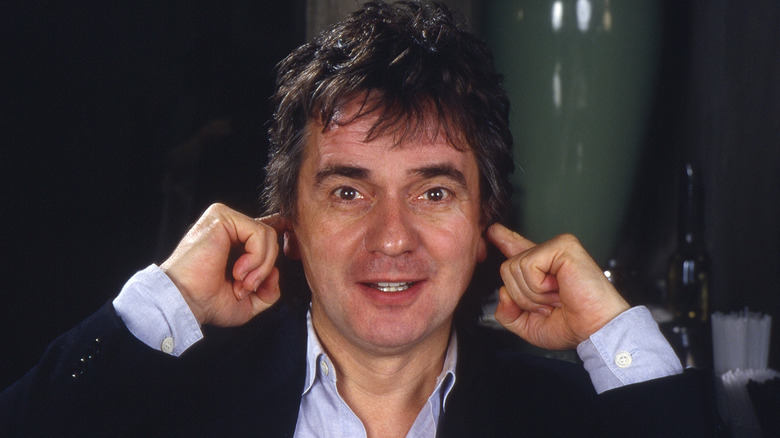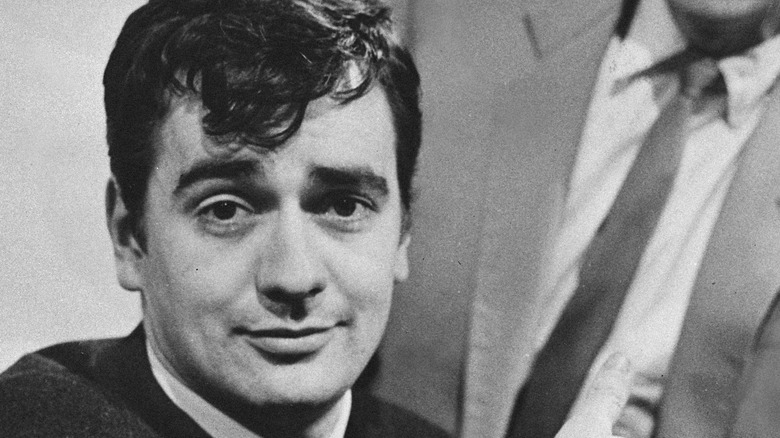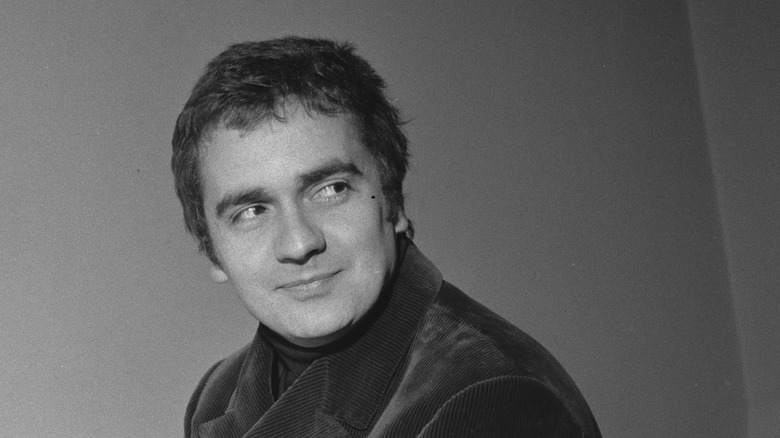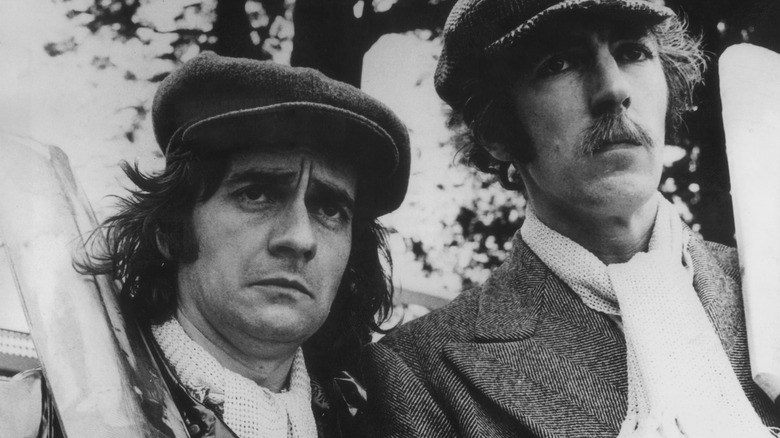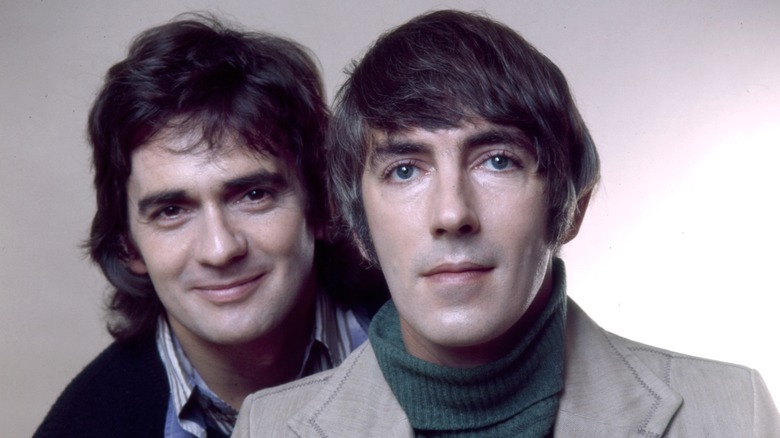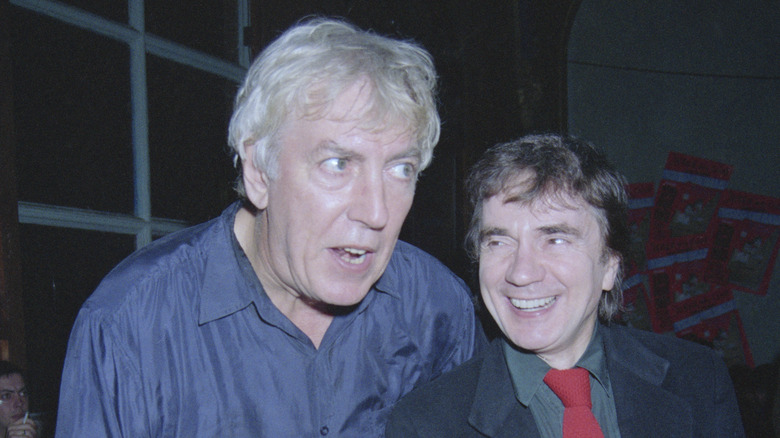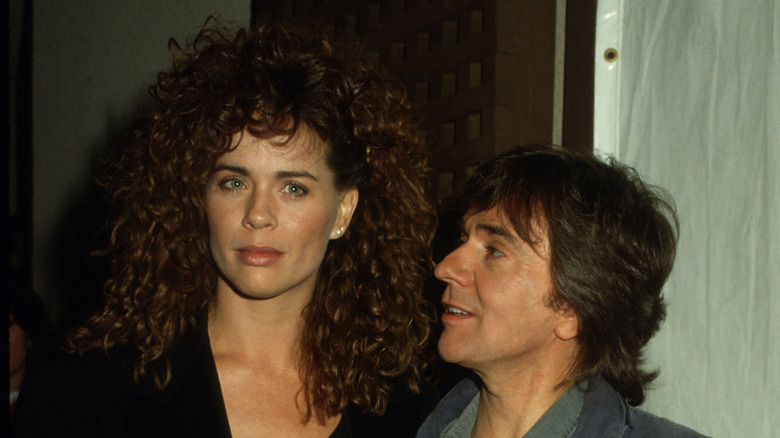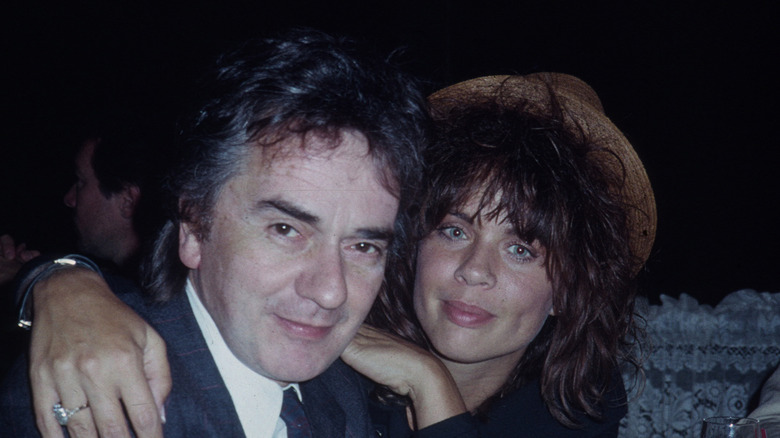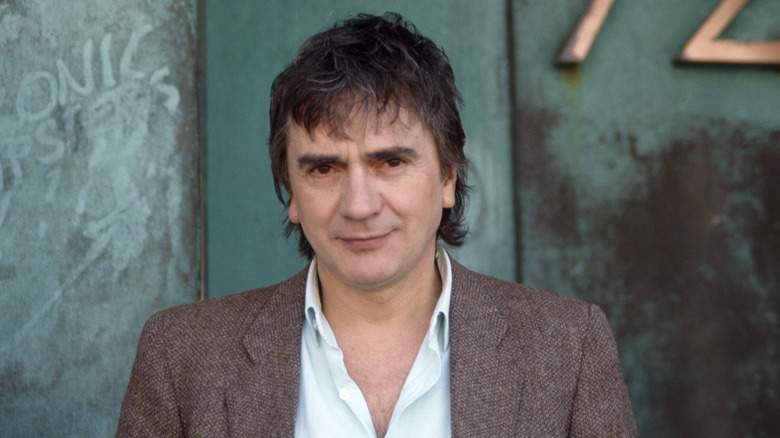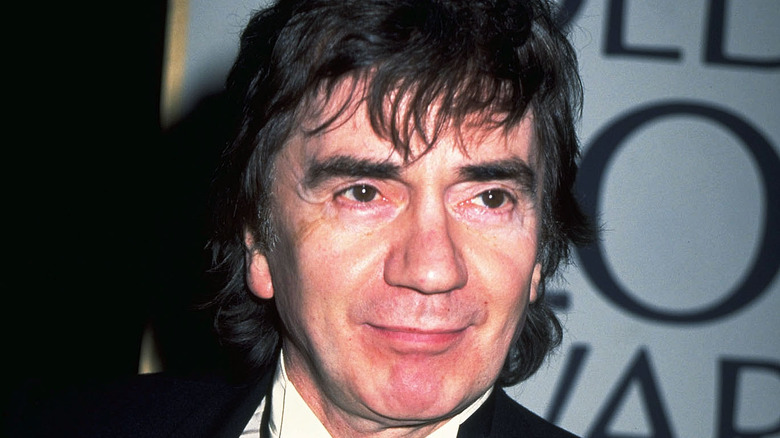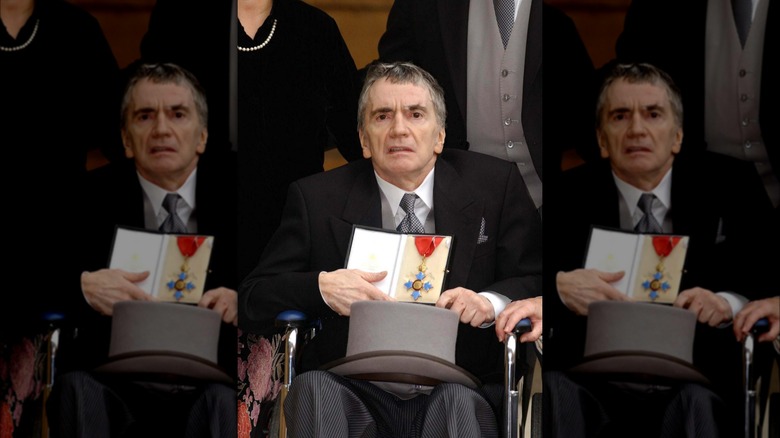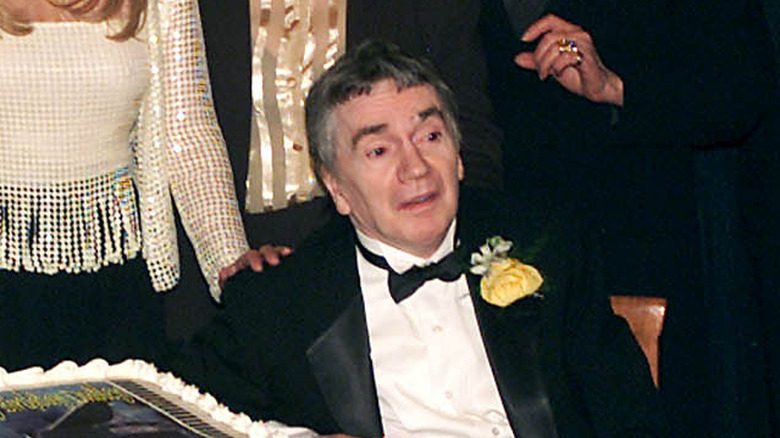The Tragedy Of Dudley Moore's Life And Death Explained
Dudley Moore was arguably Hollywood's unlikeliest star. He had a few strikes against him, such as his working-class background, growing up in a home of modest means in East London. Then, of course, there was his diminutive stature — just over 5 feet and 2 inches in height — and his club foot, which required wearing a special shoe to compensate for the fact that his left leg was about a half-inch shorter than his right. All in all, not exactly the typical combination for a Hollywood sex symbol.
Yet that's what he became, with his handsome good looks, hilarious comedic skills, and masterful musical ability propelling him from half of a revered and groundbreaking British comedy duo to headlining hit movies. Those included his breakout starring role in "10" — as a guy in the midst of a mid-life crisis who contemplates an affair with Bo Derek — to his Oscar-nominated performance as a perpetually intoxicated millionaire in "Arthur." In the early 1980s, the National Alliance of Theater Owners named him Hollywood's top male star of the year at the box office — a level of stardom that he'd always dreamed of, but never thought he'd actually ever achieve.
However, all that success was tinged with sadness; prior to his 2002 death at the age of 66, he'd endured more than enough heartbreak to fill any life. Here is the tragedy of Dudley Moore's life and death explained.
Dudley Moore's mother contemplated killing him as a newborn
Dudley Moore was born to a working-class family living in Dagenham, in East London. At birth, both of his feet were clubbed, turning inwards. His left leg, however, was noticeably deformed and significantly smaller than the other. The condition of her newborn child proved shocking to his mother, Ada.
As Moore's biographer, Barbara Paskin, recalled in her book, "The Unauthorized Biography of Dudley Moore," his mother's first response at being presented with her baby wasn't delight, but horror and denial. "This isn't my baby, this isn't my baby!" she screamed, refusing to believe that the deformed child could be hers. She became overwhelmed with feelings of guilt, anxiety, and depression, which may have subsided over time, but never entirely vanished.
This understandably fostered a mother-son relationship that was somewhat far from what most would consider to be the norm. When Moore grew older, for example, his mother candidly told him that she'd considered killing him when he was an infant — for his own good, she'd explain, in order to spare him the painful life that she envisioned ahead for him. "She said I would suffer unbearably," Moore told Paskin, "but obviously it was the pain she was going to suffer, feeling as she did that she was on trial for producing a hunchback."
Dudley Moore spent most of his childhood hospitalized
In an attempt to correct his club feet, Dudley Moore underwent a surgical procedure when he was just two weeks old. This was to be the first of numerous operations that would keep him in and out of hospitals throughout the first seven years of his life. His stronger right foot, curved inward at birth, was eventually able to be corrected; his left foot, however, required numerous surgeries, none of which were ultimately successful. The impact on Moore, though, was to condemn him to a lonely, painful childhood.
During one of those early stays in the hospital, Moore experienced loving, kind treatment from a nurse — a very different experience from the coldness he experienced from his parents, and something that he eventually came to realize wasn't his fault. "I don't know that either of them could express love very well, either to each other or to us," he told Barbara Paskin (per "The Unauthorized Biography of Dudley Moore") of the aloof indifference he and his sister felt from their parents when they were kids.
As he recalled, it all crystallized when one nurse bade him goodnight by tenderly kissing him on the cheek — something his own mother had never done. "In many ways my entire life is based on recapturing that single moment of affection," he told Paskin.
Bullying over his height and club foot led to a lifelong inferiority complex
During the earliest years of his life, Dudley Moore's life revolved entirely around home and hospitals. "His parents were a bit reclusive. His mother built up a sort of fortress in her house," Moore's childhood friend, Teifion Griffiths, revealed in the BBC documentary "Dudley Moore: After The Laughter." When Moore began school, he couldn't help but notice he was different from the other children — due to his short stature and club foot — and was predictably bullied. "I remember kids sniggering and smirking — they called me Hopalong ..." Moore once told Time.
However, he quickly learned to defuse those situations with his keen sense of humor and his innate musical talent on the piano. "I mean, there were stories that he was bullied," school friend Jim Johnson said, "but I guess the minute you offer Dudley the chance either to perform on the piano or as a comedian, I think bullying goes out the window, because the bullies can't handle talent."
Still, that feeling of being ostracized, perceived as being less valued than his other classmates, was something that continued to resonate with Moore throughout his life. "I certainly did feel inferior," he recalled in a 1980 interview with Newsday (via CBS News). "Because of class. Because of strength. Because of height ... I guess if I'd been able to hit somebody in the nose, I wouldn't have been a comic."
Comedy partner Peter Cook's alcoholism contributed to their breakup
Everything changed for Dudley Moore when he joined forces with Peter Cook, Alan Bennett, and Jonathan Miller for "Beyond the Fringe," the 1960s satirical comedy revue that broke out at the Edinburgh International Festival. "Beyond the Fringe" eventually became the toast of London's West End, followed by Broadway. Eventually, Moore and Cook successfully splintered off as a comedy duo, recording hit albums, starring in their own British TV shows (such as "Not Only ... But Also"), and even venturing into the movies, beginning with 1967's "Bedazzled."
While they were undoubtedly hilarious together, their offstage relationship was far more fraught than audiences likely realized. As Moore told Time, both were intensely competitive toward each other. "One of us was always trying to get the better of the other and, in public, we each adopted a superior attitude," Moore explained. "He was bored by my desire to please, and I scorned his relentless and perverse cynicism." There was another factor: Cook's heavy drinking, which negatively impacted his performances and sharpened his cruelty toward Moore, whom he'd often describe as "a deformed dwarf," according to William Cook's biography "One Leg Too Few."
"Peter was a very, very nice and kind person who when drunk would become vicious and unpleasant," Cook's friend, Richard Ingrams, told The Express. "And he took it out particularly on Dudley and broke up the partnership."
If you or anyone you know needs help with addiction issues, help is available. Visit the Substance Abuse and Mental Health Services Administration website or contact SAMHSA's National Helpline at 1-800-662-HELP (4357).
He was devastated by Peter Cook's death
By the time Dudley Moore and Peter Cook officially ended their professional partnership in the early 1980s, Moore was already an up-and-comer in the movies. In fact, he'd quickly taken Hollywood by storm when a supporting role in the comedy film "Foul Play," starring Goldie Hawn and "Saturday Night Live" alum Chevy Chase, propelled him to bona fide movie stardom with "10." Cook, whose own career was sputtering, could barely conceal his raging jealousy at Moore's success. "It couldn't happen to a nicer guy," Cook once deadpanned, according to William Cook's biography "One Leg Too Few." "Perhaps if I had been born with a club foot and a height problem I might have been as desperate as him to be a star."
Even though their comedy alliance ended under rancorous circumstances, Moore was nonetheless devastated when Cook died in 1995 at age 57 from a gastrointestinal hemorrhage. "Oh God, the ***ker's dead. There's a hole in the universe," Moore was said to have exclaimed upon hearing the tragic news, according to Harry Thompson's "Peter Cook: A Biography." While Moore's emotions over Cook's passing were understandably mixed, he was hit hard by the loss. "I felt hollow," Moore told The Independent several months after Cook's death. "I did not know how to respond."
He was divorced four times and never found lasting love
Dudley Moore's inferiority complex and lack of parental affection as a child propelled him on a lifelong quest for love, manifesting itself in seeking the adoration of audiences and a voracious appetite for sex. "I felt very humiliated about my height when I was a child," he explained in a 1983 interview with Time. "Then, when I became interested in what can only be described as the opposite sex, I felt that being small was a disadvantage. I felt unworthy of anything, a little runt with a twisted foot."
At that point, he'd been divorced twice, having ended his marriages to British actor Suzy Kendall and movie star Tuesday Weld, his second spouse. At the time, he insisted he was through with matrimony. "I don't want to be married again," he said. "It makes me feel that I have joined a club I don't want to be in."
That was a promise Moore didn't keep. After his relationship with actor Susan Anton ended, he got married twice more — with both unions ending in divorce. Moore's third wife, Brogan Lane, filed for divorce in 1990, after less than three years of marriage, and his next marriage was even shorter, with fourth wife Nicole Rothschild — 29 years younger than him when they wed in April 1994 — filing for divorce in June 1996. When Moore died just a few years later, the true love he'd always desired had eluded him.
He was arrested and charged with domestic assault
Dudley Moore's doomed fourth marriage to Nicole Rothschild was plagued with drama long before they walked down the aisle. In March 1994, he was arrested and charged with domestic assault when she accused him of beating her. Moore denied the allegations and spent a night in jail. Rothschild didn't press charges, later insisting it had been a misunderstanding; shortly after, Moore popped the question, and they wed that April. Moore's biographer, Barbara Paskin, claimed it was Rothschild who'd assaulted him. "She was irrational, unpredictable and violent," Paskin told the Daily Mail, describing the scene after she'd allegedly smashed numerous glass objects in Moore's home. "It was like walking over a bomb site," she recalled.
In August 1995, just over a year after the wedding — and just six weeks after the arrival of their son, Nicholas — Moore moved out, followed by her divorce filing. Rothschild subsequently hit him with a $10-million lawsuit, accusing him of emotional and physical assault, claiming he'd forced her to take amphetamines so she could arouse him by dancing seductively for up to 20 hours a day. She dropped the suit and they briefly reconciled, but the following month Moore obtained a restraining order against her. She then refiled her lawsuit, but dropped it again in 1998 because of Moore's failing health. "He said he was waiting to die," she told "Extra" (via Tampa Bay Times). "I don't want to be the reason he goes over the edge."
If you or someone you know is dealing with domestic abuse, you can call the National Domestic Violence Hotline at 1−800−799−7233. You can also find more information, resources, and support at their website.
Dudley Moore was diagnosed with a rare brain disease
As his fourth ex-wife noted back in 1998, Dudley Moore's health had been deteriorating. In the fall of 1997, he had a series of strokes after undergoing open-heart surgery to repair a hole in his heart and unclog an artery that had become blocked. There were, however, even more serious health issues on the horizon.
The first signs surfaced in 1996, when he'd been cast in Barbra Streisand's "The Mirror Has Two Faces." He made headlines when he abruptly exited the film, reportedly fired because he couldn't remember his lines. It was during a subsequent concert tour of Australia, with Moore playing alongside concert pianist Rena Fruchter, when he began experiencing difficulties playing piano. As his symptoms worsened, he was eventually diagnosed with progressive supranuclear palsy, a rare brain disease not unlike Parkinson's.
In 1999, Moore went public with his diagnosis, expressing his hope that others with the same malady, which often went undiagnosed, could understand the truth behind their troubling symptoms. His statement was infused with his characteristic humor. "I understand that one person in 100,000 suffers from this disease, and I am also aware that there are 100,000 of my union, the Screen Actors Guild, who are working every day," he said, as reported by the BBC. "I think, therefore, it is in some way considerate of me that I have taken on this disease for myself, thus protecting the remaining 99,999 SAG members from this fate."
His symptoms led to assumptions of intoxication
During the period between Dudley Moore's diagnosis of progressive supranuclear palsy and him publicly announcing it in 1999, he displayed a range of symptoms, which included slurring his words, difficulties with motor function, and problems with balance. This apparently led people to draw a comparison to the permanently intoxicated character he played in "Arthur." "People started saying I was drunk on stage. It was dreadful," he said (via the BBC).
Moore expressed similar sentiments when he sat down for an interview with Emmy-winning broadcast journalist Barbara Walters on "20/20." "It's amazing that Arthur has invaded my body to the point that I have become him," he jokingly observed (via ABC News). "But that's the way people look at it." As Moore told Walters, he had a message he wanted to get across to the public regarding those assumptions. "I want them to know that I'm not intoxicated," he said. "And I just want them to know that I am going through this disease as well as I can."
As Moore told Walters, he felt as if he'd been betrayed by his own body, imprisoned within a rapidly deteriorating physical form while facing an inevitable fate he was powerless to change. "It's totally mysterious the way this illness attacks, and eats you up, and then spits you out," he lamented to the BBC.
Dudley Moore's final years were spent dealing with serious illness
At the time that Dudley Moore announced his diagnosis of progressive supranuclear palsy in 1999, he needed the assistance of a cane to walk. His vision had also deteriorated, as had his speech. He anticipated that he'd be confined to a wheelchair within the year, and doubted that he'd live longer than another four years. Having gone public with his medical diagnosis, Dudley Moore gradually began retreating from the public eye.
In November 2001, he made what was to be his final public appearance when he journeyed to London's Buckingham Palace, where he was made a Commander of the Order of the British Empire by the then-Prince of Wales, who'd eventually become King Charles III. Moore was accompanied by his older sister, Barbara Stevens, with the two arriving in style in a 1954 Rolls Royce Silver Wraith, the same car favored by his character in "Arthur."
Sadly, by that point his illness had progressed dramatically. He was, as he'd predicted, in a wheelchair, while the condition had also robbed him of the power of speech, leaving him unable to communicate — although he remained fully aware of what was going on. As his friend Brian Dallow told The Guardian, he was excited to receive the honor from the future king, although the circumstances were far from optimum. "It's extremely frustrating for Dudley. He understands everything," Dallow said. "It all goes in, but it's so difficult for him to respond."
Dudley Moore died from pneumonia at 66
Generally speaking, the life expectancy for those diagnosed with progressive supranuclear palsy (PSP) is not long, typically between six and nine years following diagnosis. Dudley Moore did not beat those odds: He died in March 2002 in Plainfield, New Jersey, at the home of his caregiver. He was 66 years old. In the four months since he'd been honored at Buckingham Palace, home of Britain's royal family, his condition had continued to deteriorate even further. During those final months, Moore was in constant pain as he gradually ceded control of his own body. Ultimately, even the act of swallowing had become a painful and arduous process. The cause of death was determined to be pneumonia, a complication brought about by PSP.
Moore's longtime friend, jazz singer Dame Cleo Laine, felt that death had been merciful given how diminished he'd become by the end. "In lots of ways it's a release for him," she told the BBC. "He had to be fed and washed and looked after like a baby."
Among those to pay tribute was his "Arthur" co-star, "Cabaret" Oscar-winner Liza Minnelli. "He was a wonderful man. He was funny and dear and supportive and hilarious and he was one of my heroes," she said, revealing that she'd spoken to him days before his death, and that he was able to form his final words to her: "I love you."
